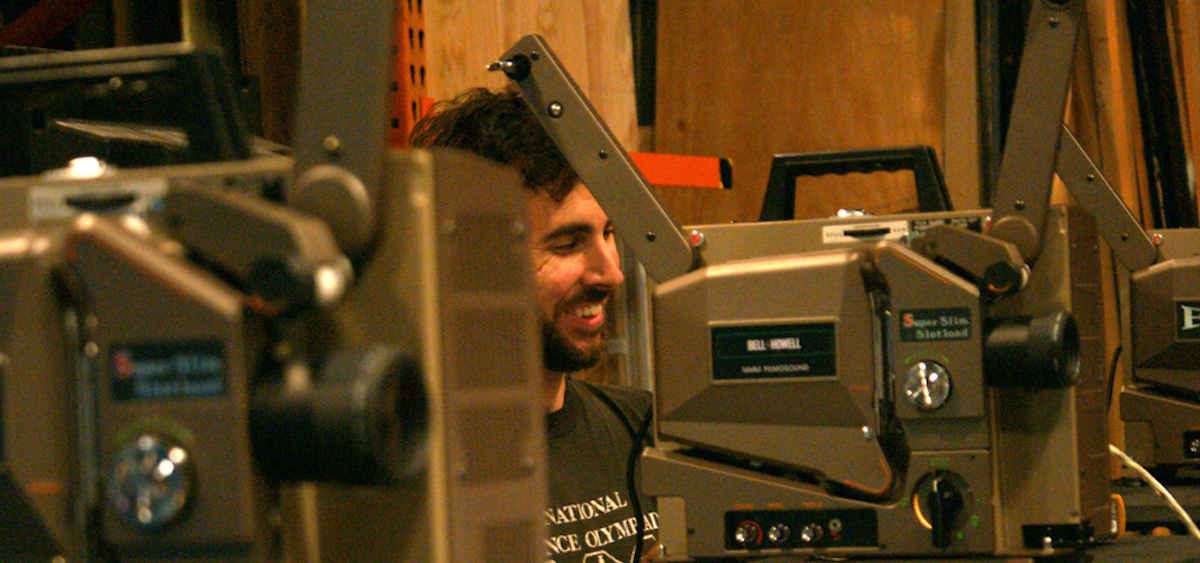Culture

Artist Roger Beebe to Bring Experimental Film Performance to ARTS/West
By: Emily Votaw
Posted on:
Atmospheric, almost atonal sound fills the room as several projectors work together to create a thick forest of film — overlaid images play out over the screen: a faded cartoon horse and buggy make their way across the bottom of the projection; mountains and crashing waves crawl the surface of the wall; abstract images and grainy film percolates upwards in the projection.
That’s an attempt to describe Columbus-based film artist Roger Beebe’s film performances, which have traveled all around the world, from the CBS Jumbotron in Times Square to the Sundance Film Festival to the McMurdo Station in Antarctica.
On Sunday, September 23, Beebe will bring his work to ArtsWest (132 West State St., Athens), starting at 1 p.m. The event is free and open to the public.
Beebe hasn’t always utilized film as a medium for performance. In fact, one of the facets of film that he first enjoyed was its inherent durability and inability to substantially change after completion. When speaking about this, he explains that he was dating a dancer when he began making films.
“I always thought that it was sad that a dance performance was so ephemeral, that it would only happen maybe once or over a weekend or a few weeks, and then it would be lost forever. I thought that one of the great things about film was that you could make it, and then it’s there – you can send it around and you don’t even have to go with it,” Beebe said.
However, as Beebe began to tour his work as a filmmaker in a conventional setting, he often found himself “just waiting around for the question and answer period, just bored watching my own films for the 27th time.”
As a remedy to this, the artist began to experiment with performative work with film around 2007, when he did his first tour, a four month jog up the east coast consisting of 35-40 shows that combined archival footage, new footage, and a plethora of projectors.
“Basically, I have a multi-projector performance program that uses individual works that I put together into a 75-minute program,” Beebe said. “I use different configurations of projectors; I think that the grand finale actually uses six 16-millimeter projectors and a super eight projector, and the film fills up the screen and often spills off the screen with original and found images.”
Beebe utilizes an archive of 16-millimeter films, as well as camera-less work and work directly with the physicality of the film, during his performances.
“Some of the films are more abstract, some of them are more representational, and some of them are experimental documentaries looking at things like strip mall sprawl and abandoned buildings from our recent moment in the industrial past,” said Beebe. “Some of them are more interested in film material; thinking about what images are made of in a more modernist way. Looking at things like the grain of the film, the surface of the film itself, the chemistry of the film, patterns of light and dark, and how an optical soundtrack works.”
David Colagiovanni, the director of the Athens Center for Film and Video, the organization that has arranged Beebe’s visit to Athens, said that he first met Beebe when Beebe was running a screening event called Flicker in Chapel Hill, North Carolina.
“I’ve always admired his work and it’s really great to bring him to perform here,” said Colagiovanni. “That’s the only way you can really see what his work is like. You can watch it online, but his work really exists on a larger screen with multiple things going on. (During his performances) he’s the projectionist, he’s the filmmaker, he’s the technician – all at the same time.”
Tanner Bidish, a senior at Ohio University who is pursuing a major in screenwriting, said that he is looking forward to Beebe’s performance.
“Pretty much all that I know about Roger (Beebe) is what David (Colagiovanni) has told me, since he’s sort of my connection to him,” said Bidish. “I just know that I am going to be there and that I am going to have my mind blown.”
The ephemeral quality of the performances is now of central importance to the work Beebe creates.
“In this era, when there is easy access to screens everywhere, I feel like (these performances) are something that is happening that you can’t just access anywhere, anytime (…) when it is happening we are present to each other in an interesting, human way that we aren’t present with each other too often, or if we are, only virtually. There’s a kind of human exchange and urgency to the thing because you know that what you are seeing will never be replicated again exactly,” Beebe said. “Even with all the projectors, that’s kind of a spectacle. At that point, we’re almost back to the earliest days of cinema where we have projectors on display, and it’s sort of a novelty in 2018 to see an army of 16-millimeter classroom projectors, like it’s 1895 all over again.”

